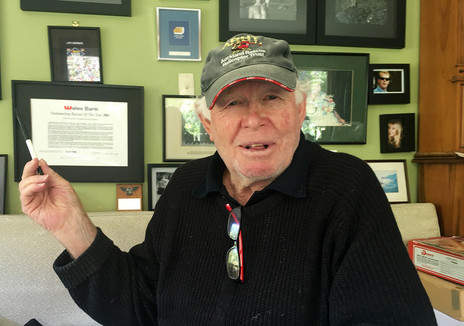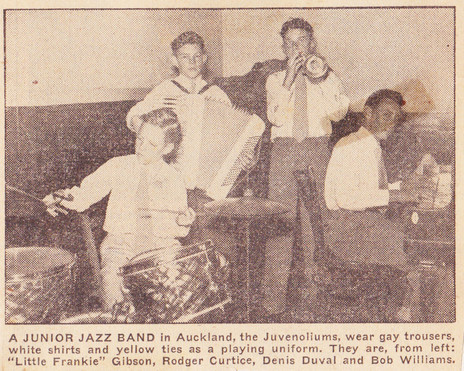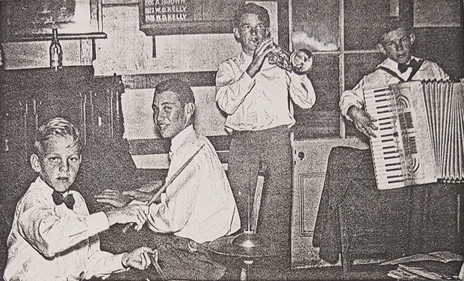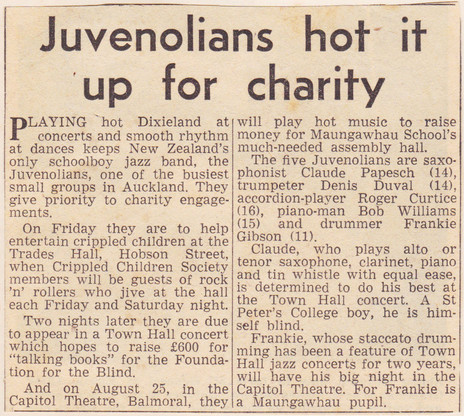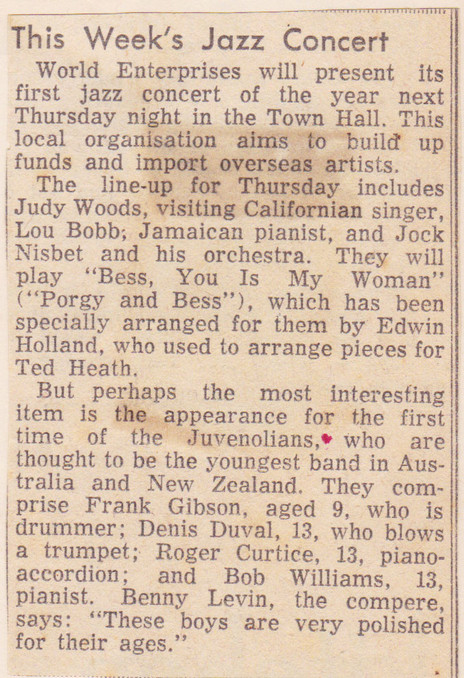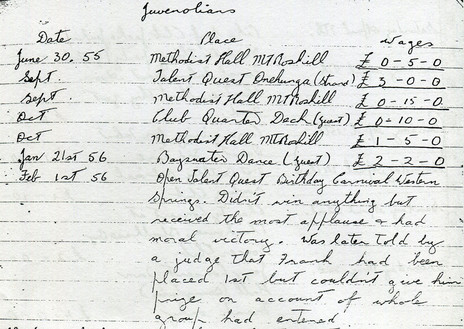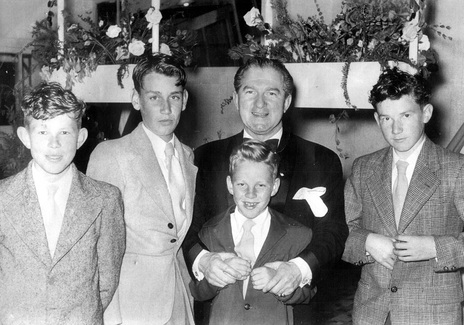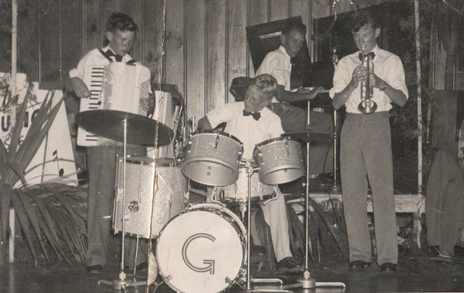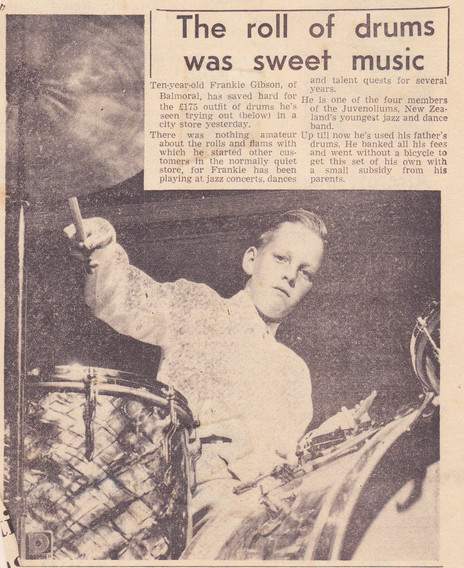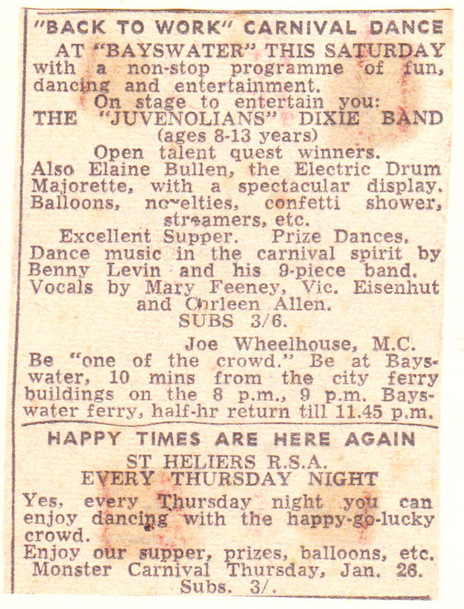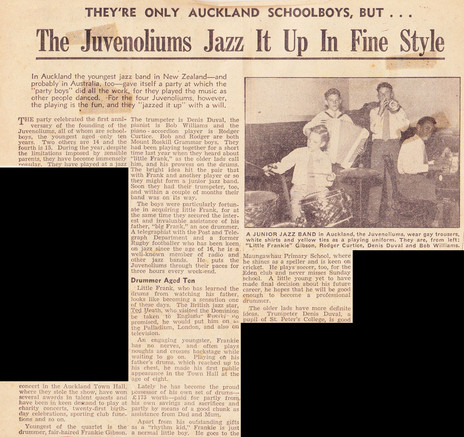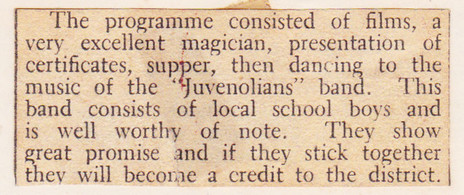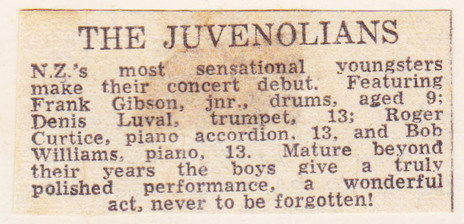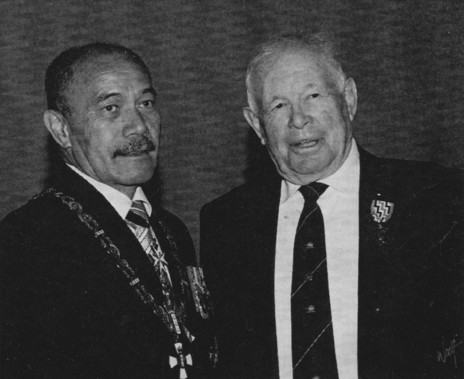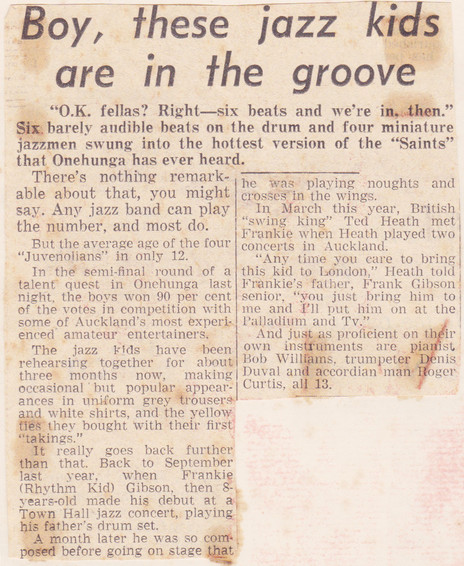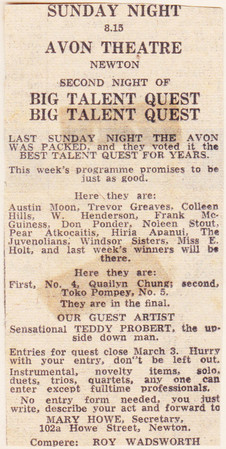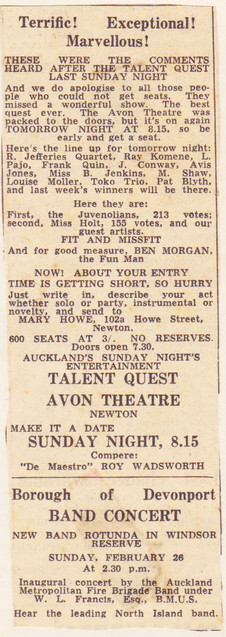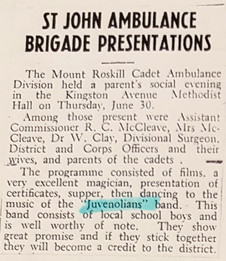They might not have been the first rock’n’roll act in Auckland, but they were probably the youngest. The Juvenolians started out playing jazz when Rodger was at Balmoral Intermediate, forming in the early 1950s. “I got Bob Williams, we were at Mt Roskill Grammar. Jack and Ann Dixon were my neighbours in Mt Roskill, they had a piano – my father had one but it was quieter over there – we went there and played with just piano and piano accordion. Then we heard about Frank [Gibson Jr]. So we got Frank.”
Frank Gibson Jr came on board in late 1954. Word of his talent quickly spread after he played with his father, Frank Gibson Sr, at the Auckland Town Hall in October 1954.
Frank Sr also knew Denis Duval, “a good trumpeter”. “So that was the four of us.”“Frank was nine, we were eleven,” says Curtice. “Being the youngest, he always got the mention. We weren’t known to the media but the Gibsons were.”
FRANK GIBSON JR WAS 9 YEARS OLD WHEN THE JUVENOLIANS BEGAN; THE REST OF THE BAND WAS 11.
The Juvenolians played their first dance job at Mt Roskill Methodist Hall in 1954, which became a regular spot for them. Among their many appearances at halls and talent contests, they played a talent quest in Onehunga in September 1954, winning 90 percent of the votes. They played at the Club Quarter Deck in October 1955, and won the Bayswater Carnival open talent quest in January 1956. On 1 February 1956 they entered the Open Talent Quest Birthday Carnival at Western Springs – although they didn’t win anything on that occasion they received the loudest applause. Just before Frank’s 10th birthday, on 16 February 1956 (Frank was born 19 February 1946), they played their first official jazz concert, performing four tunes and stealing the show.
As the group got older other players included Murray Cruickshank on drums and Claude Papesch, whose father Joseph Papesch taught music at the blind institute in Auckland. “Claude was our saxophonist. He came in on the band and we kind of expanded a bit. Sometimes young Frank couldn’t do it because of school, so we had Murray Cruickshank, who learned off Frank Sr, he played drums for us. But it was just the four of us for about three years.”
The Juvenolians played alongside the Crombie Murdoch Trio, Pat McMinn, The Stardusters, Nancy Harrie, and “the top guys who were playing jazz concerts at the Town Hall and everywhere. Frank Sr knew Claude’s father, so through them we really broke into the who’s who of music.”
Frank Sr soon had them sharpened up and rehearsing with older players. “We used to train, every Sunday we would have a three- or four-hour practice and Frank would bring Crombie Murdoch along sometimes. They’d bring the [drummer] from North Piha, Don Branch, who played with Gene Krupa. He’d get other musos from his band at the Crystal Palace; Frank had the band there that played under the movie theatre.”
The young band played the Peter Pan, Crystal Palace, Trades Hall, the Pirate Shippe in Milford, The Orange, St Seps. “We were sometimes out seven nights a week. We were making more money than our parents, or just about.”
Playing up to seven nights a week, the Juvenolians made more money than their parents.
Playing out of town happened a bit, too. Curtice remembers playing dances in Thames to 800 people, often until 3am. “That’s where I had to give my old man a nudge on the way home.” Curtice Sr had requested a poke in the ribs to keep him awake while driving back to Auckland.
“They’d write themselves off, Frank and my old man. It was a great outlet for them, [to] go out partying every night – because we had to have a senior with us, none of us could drive.”
It was a real eye opener for a young group. “We went to some really weird functions where people were so drunk they’d throw booze over everyone.”
The Juvenolians played with UK big band leader and “swing king” Ted Heath, who played two concerts in Auckland during his 1955 Australasian tour. Heath wanted to take the boys back to the UK on tour with his band and put them on English television.
They also played with Trinidadian boogie-woogie and ragtime pianist Winifred Atwell. “We played at the 1ZB theatre [Broadcasting House, on Durham Street], they had seating for about 200 people there. Then we toured to Frankton for the British league team. They had a big do for them.”
Curtice recalls returning via car ferry to downtown Auckland after playing at the Olde Pirate Shippe venue in Milford. “The ferry driver would do a couple of big circles in the harbour to slow down, that’s where we’d make good money – five pound notes would be thrown at us as we played. Instead of the trip being ten minutes it stretched out to half an hour.”
Although the band started out playing jazz, they were swept along with the rock’n’roll wave. “We were always jazz. Presley and the Big Bopper, all those, they hadn’t started then. They were about a year after we started, so we got all that music. We started playing ‘Rock Around the Clock’, ‘Blue Suede Shoes,’ the whole works.
“Everybody was into rock’n’roll. We were basically foundation players” – Rodger Curtice
“Everybody was into rock’n’roll. We were basically foundation players. We would get all the new music, it would only take us a week to learn them. If you’re musical you pick it up very quickly, and we were playing all the time.”
No recordings are known to exist of the Juvenolians, although Rodger remembers visiting a recording studio, Astor, run by Noel Peach. “We went to Peach one day but I think I stuffed it up, I was too loud on the accordion, they couldn’t fix the balance.”
The Juvenolians finished up in 1957. “We were fourteen to fifteen when we broke up. We all had to go to school. I mean, we were drinking booze at eleven and twelve. And we got to see life in its raw. We went for four years then we had to concentrate on secondary school, and Frank was going to intermediate school – we just had to do school work, which we weren’t doing.”
